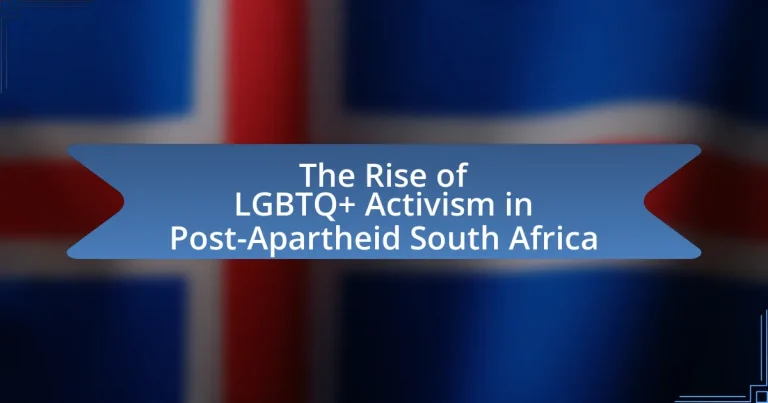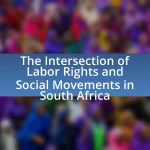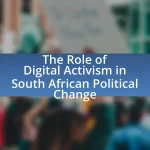The main entity of the article is LGBTQ+ activism in post-apartheid South Africa. The article outlines the significance of this activism in advancing legal rights and social acceptance for LGBTQ+ individuals following the end of apartheid in 1994. It highlights key milestones such as the inclusion of sexual orientation in the 1996 Constitution, the legalization of same-sex marriage in 2006, and the impact of international influences on local movements. Additionally, the article discusses the evolution of societal attitudes, ongoing challenges faced by activists, and the role of social media in raising awareness and mobilizing support for LGBTQ+ rights. It also emphasizes the importance of intersectionality within the movement and provides resources for individuals looking to engage in activism.

What is the significance of LGBTQ+ activism in post-apartheid South Africa?
LGBTQ+ activism in post-apartheid South Africa is significant as it has played a crucial role in advancing legal rights and social acceptance for LGBTQ+ individuals. Following the end of apartheid in 1994, South Africa became the first country in Africa to enshrine LGBTQ+ rights in its constitution, explicitly prohibiting discrimination based on sexual orientation. This legal framework has empowered activists to challenge societal norms and advocate for equality, leading to landmark achievements such as the legalization of same-sex marriage in 2006. Furthermore, LGBTQ+ activism has raised awareness about issues such as hate crimes and discrimination, fostering a broader dialogue on human rights within the country. The activism has also contributed to the visibility of LGBTQ+ communities, promoting acceptance and support in various sectors of society.
How did the end of apartheid influence LGBTQ+ rights?
The end of apartheid significantly advanced LGBTQ+ rights in South Africa by establishing a legal framework that explicitly protects sexual orientation and gender identity. In 1996, the new South African Constitution became the first in the world to prohibit discrimination based on sexual orientation, reflecting a commitment to human rights for all citizens. This constitutional protection laid the groundwork for subsequent legal reforms, including the legalization of same-sex marriage in 2006, which further solidified the rights of LGBTQ+ individuals. The transition from apartheid also fostered a more open societal dialogue about sexual diversity, leading to increased visibility and activism within the LGBTQ+ community.
What legal changes occurred regarding LGBTQ+ rights after apartheid?
After apartheid, South Africa enacted significant legal changes to advance LGBTQ+ rights, notably the inclusion of sexual orientation as a prohibited ground for discrimination in the 1996 Constitution. This landmark decision made South Africa the first country in Africa to explicitly protect LGBTQ+ individuals under its constitution. Additionally, in 2006, the Constitutional Court legalized same-sex marriage, affirming the rights of same-sex couples to marry and adopt children. These legal reforms reflect a commitment to equality and human rights for all citizens, regardless of sexual orientation.
How did societal attitudes towards LGBTQ+ individuals shift post-apartheid?
Societal attitudes towards LGBTQ+ individuals shifted significantly post-apartheid, moving from widespread discrimination to greater acceptance and legal recognition. The end of apartheid in 1994 marked a pivotal moment, as the new South African Constitution explicitly prohibited discrimination based on sexual orientation, making it one of the first in the world to do so. This legal framework facilitated the emergence of LGBTQ+ activism, leading to increased visibility and advocacy for rights. Public opinion gradually evolved, with surveys indicating a rise in acceptance; for instance, a 2016 study by the Pew Research Center found that 49% of South Africans supported same-sex marriage, reflecting a notable change from previous decades.
What role did international influences play in LGBTQ+ activism?
International influences significantly shaped LGBTQ+ activism by providing resources, visibility, and solidarity that empowered local movements. For instance, global organizations like ILGA (International Lesbian, Gay, Bisexual, Trans and Intersex Association) offered platforms for advocacy and networking, which facilitated the exchange of strategies and experiences among activists. Additionally, international human rights frameworks, such as the Yogyakarta Principles, helped legitimize LGBTQ+ rights within South Africa, influencing local legislation and public discourse. The presence of international allies and funding from foreign NGOs also bolstered grassroots efforts, enabling campaigns that addressed discrimination and violence against LGBTQ+ individuals.
How did global LGBTQ+ movements impact South African activism?
Global LGBTQ+ movements significantly influenced South African activism by providing frameworks for advocacy, solidarity, and legal reform. The global push for LGBTQ+ rights, particularly during the 1990s and 2000s, inspired South African activists to adopt similar strategies, such as organizing pride events and lobbying for anti-discrimination laws. For instance, the influence of international organizations like ILGA (International Lesbian, Gay, Bisexual, Trans and Intersex Association) helped South African groups to gain visibility and support, culminating in the inclusion of sexual orientation in the South African Constitution in 1996. This constitutional protection was a direct result of both local and global advocacy efforts, showcasing how interconnected movements can lead to significant legal advancements in LGBTQ+ rights.
What support did South African activists receive from international organizations?
South African activists received significant support from international organizations, which included funding, advocacy, and capacity-building initiatives. Organizations such as Human Rights Watch and Amnesty International provided financial resources and global platforms to amplify the voices of LGBTQ+ activists. Additionally, these international entities engaged in lobbying efforts to influence South African policies and promote human rights protections for LGBTQ+ individuals. For instance, during the 2012 UN Human Rights Council session, international organizations highlighted the challenges faced by LGBTQ+ communities in South Africa, thereby increasing international awareness and pressure for reform.

What are the key milestones in the rise of LGBTQ+ activism in South Africa?
Key milestones in the rise of LGBTQ+ activism in South Africa include the decriminalization of homosexuality in 1998, the adoption of the Constitution in 1996 which guaranteed equal rights, and the legalization of same-sex marriage in 2006. The decriminalization of homosexuality marked a significant shift in legal recognition, allowing LGBTQ+ individuals to live without fear of prosecution. The Constitution’s inclusion of sexual orientation as a protected category established a legal framework for equality. The legalization of same-sex marriage further solidified the rights of LGBTQ+ individuals, making South Africa the first African country to recognize such unions. These milestones collectively reflect the progress and ongoing challenges faced by the LGBTQ+ community in South Africa.
What major events marked the progress of LGBTQ+ rights?
Major events that marked the progress of LGBTQ+ rights include the decriminalization of homosexuality in South Africa in 1998, the adoption of the Constitution in 1996 which included protections against discrimination based on sexual orientation, and the legalization of same-sex marriage in 2006. The 1996 Constitution was a landmark achievement, as it was one of the first in the world to explicitly protect LGBTQ+ individuals. The 2006 legalization of same-sex marriage made South Africa the first African country to recognize such unions, reflecting significant advancements in LGBTQ+ rights within the post-apartheid context.
How did the formation of LGBTQ+ organizations contribute to activism?
The formation of LGBTQ+ organizations significantly contributed to activism by providing a structured platform for advocacy, community support, and political engagement. These organizations mobilized individuals, fostering a sense of solidarity and collective identity among LGBTQ+ people, which was crucial in challenging systemic discrimination and promoting rights. For instance, the establishment of groups like the Gay and Lesbian Alliance of South Africa (GLASA) in the 1990s played a pivotal role in raising awareness about LGBTQ+ issues and influencing policy changes, such as the inclusion of sexual orientation in the South African Constitution. This legal recognition was a direct outcome of organized activism, demonstrating how these organizations effectively transformed societal attitudes and legislative frameworks.
What role did pride parades and public demonstrations play in raising awareness?
Pride parades and public demonstrations played a crucial role in raising awareness about LGBTQ+ issues in post-apartheid South Africa by providing a visible platform for advocacy and community solidarity. These events mobilized thousands of participants, fostering a sense of belonging and visibility for marginalized groups, which was essential in a society still grappling with the legacies of discrimination. For instance, the first Cape Town Pride in 2002 marked a significant moment in LGBTQ+ activism, drawing attention to issues such as hate crimes and discrimination, thereby influencing public discourse and policy changes. Additionally, these demonstrations often attracted media coverage, amplifying the voices of LGBTQ+ activists and highlighting their struggles, which contributed to greater societal acceptance and legal reforms, such as the recognition of same-sex marriage in 2006.
What challenges have LGBTQ+ activists faced in South Africa?
LGBTQ+ activists in South Africa have faced significant challenges, including societal stigma, violence, and legal obstacles. Despite the country’s progressive constitution that protects LGBTQ+ rights, activists encounter widespread discrimination and hate crimes, particularly against marginalized groups such as transgender individuals. According to a 2020 report by the South African Human Sciences Research Council, 30% of LGBTQ+ individuals have experienced physical violence due to their sexual orientation or gender identity. Additionally, activists often struggle against inadequate law enforcement responses to hate crimes, which undermines their safety and advocacy efforts. These challenges hinder the progress of LGBTQ+ rights and the overall acceptance of diverse sexual orientations and gender identities in South African society.
How has violence against LGBTQ+ individuals affected activism?
Violence against LGBTQ+ individuals has galvanized activism by highlighting systemic discrimination and the urgent need for legal protections. This violence has prompted organizations and activists to mobilize, advocating for policy changes and increased awareness of LGBTQ+ rights. For instance, the murder of LGBTQ+ activist Noxolo Nogwaza in 2011 spurred protests and calls for justice, illustrating how violent acts can serve as catalysts for collective action and heightened visibility of LGBTQ+ issues in South Africa. Consequently, such incidents have led to the establishment of support networks and campaigns aimed at combating hate crimes, thereby strengthening the overall movement for LGBTQ+ rights in the country.
What legal and political obstacles remain for LGBTQ+ rights?
Legal and political obstacles for LGBTQ+ rights in post-apartheid South Africa include inadequate enforcement of existing laws, societal discrimination, and political inaction. Despite the constitutional protections established in 1996, such as the prohibition of discrimination based on sexual orientation, many LGBTQ+ individuals face violence and discrimination, which indicates a gap between legal rights and lived experiences. Reports from organizations like the South African Human Rights Commission highlight ongoing hate crimes and lack of police protection for LGBTQ+ individuals, demonstrating that legal frameworks are not effectively implemented. Additionally, political leaders often avoid addressing LGBTQ+ issues, fearing backlash from conservative constituents, which further hinders progress toward equality.

How has LGBTQ+ activism evolved in recent years?
LGBTQ+ activism has evolved significantly in recent years, particularly in post-apartheid South Africa, where it has transitioned from a focus on legal recognition to broader social acceptance and rights advocacy. Activists have increasingly addressed issues such as gender identity, intersectionality, and the rights of marginalized groups within the LGBTQ+ community, including people of color and those living with HIV/AIDS.
This evolution is evidenced by the rise of organizations like the Triangle Project and the establishment of Pride events that not only celebrate LGBTQ+ identities but also serve as platforms for political activism and community solidarity. Furthermore, the South African Constitution, which was adopted in 1996, explicitly prohibits discrimination based on sexual orientation, providing a legal framework that has empowered activists to challenge societal norms and advocate for comprehensive anti-discrimination laws.
The increased visibility of LGBTQ+ issues in media and public discourse has also contributed to this evolution, fostering greater awareness and support among the general population.
What current issues are LGBTQ+ activists addressing?
LGBTQ+ activists in post-apartheid South Africa are currently addressing issues such as discrimination, violence, and legal inequalities faced by LGBTQ+ individuals. These activists highlight the ongoing prevalence of hate crimes, with reports indicating that LGBTQ+ individuals are disproportionately targeted for violence, particularly transgender women. Additionally, activists are advocating for comprehensive anti-discrimination laws and policies that protect LGBTQ+ rights in various sectors, including healthcare and employment. The South African Human Sciences Research Council has documented that despite legal advancements, societal stigma and discrimination remain significant barriers to equality for LGBTQ+ individuals.
How are intersectional identities represented within the movement?
Intersectional identities within the LGBTQ+ movement in post-apartheid South Africa are represented through inclusive advocacy that addresses the unique experiences of individuals based on their race, gender, sexual orientation, and socioeconomic status. This representation is evident in the work of organizations like the Triangle Project and Gender DynamiX, which focus on the specific challenges faced by marginalized groups, such as Black LGBTQ+ individuals and transgender people. These organizations highlight issues such as violence, discrimination, and access to healthcare, ensuring that the voices of those with intersectional identities are amplified in the broader movement. Additionally, events like the Cape Town Pride and Johannesburg Pride have increasingly incorporated themes of intersectionality, showcasing diverse identities and fostering dialogue around the complexities of race and sexuality in South Africa.
What strategies are being employed to combat discrimination today?
Strategies employed to combat discrimination today include legal reforms, advocacy campaigns, and community support initiatives. Legal reforms, such as the implementation of anti-discrimination laws and policies, aim to protect LGBTQ+ rights and ensure equal treatment under the law. Advocacy campaigns, led by organizations like the South African Human Rights Commission, raise awareness about discrimination and promote inclusivity through education and outreach programs. Community support initiatives, including safe spaces and mental health resources, provide essential support for LGBTQ+ individuals, fostering resilience and empowerment. These strategies collectively contribute to a more equitable society, as evidenced by the increased visibility and acceptance of LGBTQ+ individuals in South Africa since the end of apartheid.
What impact has social media had on LGBTQ+ activism?
Social media has significantly amplified LGBTQ+ activism by providing a platform for visibility, community building, and mobilization. The rise of platforms like Twitter, Facebook, and Instagram has allowed LGBTQ+ individuals and organizations in South Africa to share their stories, raise awareness about issues, and organize events, leading to increased public engagement and support. For instance, the #LoveIsLove campaign gained traction on social media, promoting marriage equality and challenging discriminatory laws. Additionally, social media has facilitated real-time communication during protests and advocacy efforts, enabling activists to coordinate actions and share information quickly. This digital landscape has also fostered global solidarity, connecting South African activists with international movements, thereby enhancing their impact and reach.
How has social media changed the way activists organize and communicate?
Social media has transformed the organization and communication methods of activists by providing instant access to a global audience and facilitating real-time information sharing. Activists can now mobilize supporters quickly through platforms like Twitter and Facebook, allowing for rapid dissemination of messages and coordination of events, such as protests or awareness campaigns. For instance, during the #FeesMustFall movement in South Africa, social media played a crucial role in organizing student protests, demonstrating how digital platforms can amplify grassroots activism. Additionally, social media enables marginalized voices, such as those within the LGBTQ+ community, to connect and share experiences, fostering solidarity and collective action across diverse groups. This shift has led to increased visibility and support for LGBTQ+ rights in post-apartheid South Africa, as evidenced by the growing number of online campaigns advocating for equality and justice.
What role does online activism play in raising awareness and support?
Online activism plays a crucial role in raising awareness and support for LGBTQ+ issues in post-apartheid South Africa by leveraging digital platforms to disseminate information and mobilize communities. This form of activism enables individuals and organizations to reach a broader audience quickly, facilitating discussions around rights, representation, and social justice. For instance, campaigns on social media have successfully highlighted instances of discrimination and violence against LGBTQ+ individuals, leading to increased public discourse and advocacy for policy changes. Research indicates that online platforms have significantly contributed to the visibility of LGBTQ+ movements, with hashtags like #LoveIsLove trending globally, thereby fostering solidarity and support across diverse demographics.
What can individuals do to support LGBTQ+ activism in South Africa?
Individuals can support LGBTQ+ activism in South Africa by participating in awareness campaigns and advocacy efforts. Engaging in local organizations, such as the Triangle Project or OUT LGBT Well-Being, allows individuals to contribute to initiatives that promote equality and fight discrimination. Additionally, attending pride events and rallies helps to amplify LGBTQ+ voices and visibility. Financial support through donations to LGBTQ+ charities and participating in fundraising events directly aids in sustaining activism efforts. Furthermore, educating oneself and others about LGBTQ+ issues fosters a more inclusive society, as informed discussions can challenge stereotypes and promote understanding.
How can allies effectively contribute to the movement?
Allies can effectively contribute to the LGBTQ+ movement by amplifying marginalized voices and advocating for equal rights. By using their platforms to share stories and experiences of LGBTQ+ individuals, allies help raise awareness and foster understanding within broader communities. Research indicates that allyship can lead to increased visibility and support for LGBTQ+ issues, as seen in campaigns that successfully mobilized public opinion in favor of same-sex marriage in South Africa, which was legalized in 2006. Furthermore, allies can participate in protests, support LGBTQ+ organizations through donations or volunteer work, and educate themselves and others about LGBTQ+ rights and issues, thereby creating a more inclusive society.
What resources are available for those looking to get involved?
Resources available for those looking to get involved in LGBTQ+ activism in post-apartheid South Africa include organizations such as the Triangle Project, which provides support services and advocacy for LGBTQ+ individuals, and the Gay and Lesbian Network, which focuses on community development and empowerment. Additionally, the South African Human Rights Commission offers resources for understanding legal rights and protections for LGBTQ+ individuals. These organizations actively engage in campaigns, workshops, and community outreach, providing concrete avenues for involvement and support in the LGBTQ+ movement.


